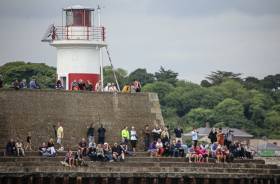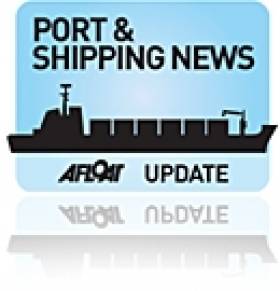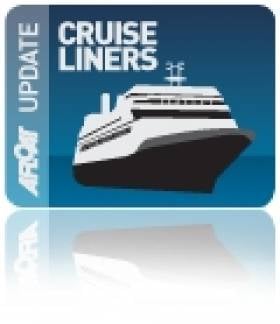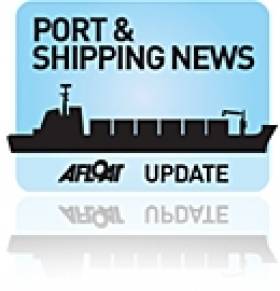Displaying items by tag: national ports policy
First Stage of Consultation Opens for National Ports Policy Review
As previously reported on Afloat.ie, the Department of Transport has commenced a review of its National Ports Policy.
As an island nation on the periphery of Europe, the maritime transport sector plays a crucial role in the functioning of Ireland’s economy. Some 90% of all goods traded by Ireland pass through the commercial port network, underscoring the importance of a resilient and efficient maritime transport industry for the country’s economic success.
But the importance of Ireland’s ports is not just economic. Located as many ports are in the heart of urban centres and areas of environmental significance, how Ireland’s ports interact with both the communities that provide their social licence to operate and the marine environment is something in which we all have a vested interest.
This revised policy aims to provide the vision for how Ireland’s ports will meet these challenges.
The review consists of a two-part consultation process. The first part involves the publication of an issues paper and consultation with all interested stakeholders who are invited to make a submission.
Upon completion of the first stage, it will be followed by a shorter public consultation on the draft policy document. The objective is to present a new draft policy to the Government in 2025 following a thorough and inclusive consultation.
Submissions are now invited for the first part of the process on the ports policy issues paper. Details on this paper and the consultation process can be found on Gov.ie and the final date for receipt of submissions is 6pm on 15 January 2024.
Wicklow Port Transferred to Wicklow County Council
#PortTransfer - Minister for Transport, Tourism and Sport Shane Ross T.D. has signed an Order transferring Wicklow Port Company to Wicklow County Council, with the consent of his colleagues Paschal Donohoe T. D., Minister for Public Expenditure and Reform and Simon Coveney T.D. Minister for Housing, Planning, Community and Local Government.
Wicklow Port is the first port to transfer under National Ports Policy which was approved by Government and published in 2013. The policy recommended that designated Ports of Regional Significance - Drogheda, Dún Laoghaire, Galway, New Ross and Wicklow - transfer to more appropriate local authority led governance structures.
These ports are important to their regional economy and the transfers support the Government’s reforms in the area of local government generally, through enhancing the role of the local authority in regional economic development. Ports of Regional Significance retain important regional roles as freight distribution hubs and also increasingly important roles in areas such as marine leisure and tourism. The Harbours Act 2015 provides the legislative basis for the transfers to proceed.
Speaking today Minister Ross welcomed the transfer and said:
“Today marks an important milestone as Wicklow Port is the first Port of Regional Significance to transfer to a local authority. Wicklow Port is a thriving regional commercial port and the transfer will provide new opportunities for the development of marine-related activities and regional freight, and to further develop marine leisure and tourism, cultural and recreation amenities in the area, offering significant potential for local employment creation.
I wish to commend the work undertaken by the Chief Executive and his staff in Wicklow County Council as well as the work undertaken by the Board and staff of Wicklow Port who have actively engaged in the due diligence process over a number of months in preparation for transfer.
As you are aware our commercial ports are vital to our future economic growth. They are the gateways for most of our merchandise trade, and for significant numbers of tourists and passengers. National ports policy encourages every port to develop its full potential to ensure that each port can contribute to growth in the overall sector. Ports of Regional significance serve a niche market and provide an important regional and local function.”
#ShippingReview – Over the last fortnight, Jehan Ashmore has reported from the shipping scene, where Minister for Transport Leo Varadkar, launched the National Ports Policy which is to radically overhaul commercial ports and the transfer of 'regional' ports to local authorities.
Among the proposed regional ports is Dun Laoghaire, where the harbour which is in the middle of the town is expected to focus on tourism, cruise liners and marine leisure activity.
In regards to larger strategic ports, (noting Port of Cork development update) they are charged with leading the response to national capacity requirements, something that is long overdue because port capacity has not been matching growth in traffic for either unitised and non–unitised cargo.
The policy follows the launch of a 30–year masterplan for Dublin Port Company over a year ago and the launch of the Shannon Estuary masterplan announced in February.
Responding to the National Ports Policy, the Irish Ports Association (IPA) which is the representative body for the Irish ports sector and an affiliate of IBEC welcomed the publication which sets out the policy framework for the future development of the sector.
Amidst snow flurries and gusts up to 34 knots, the cargoship Blue Tune departed Dun Laoghaire Harbour having discharged the final round of fermentation tanks bound for Guinness's St. James's Gate Brewery in central Dublin.
The Antigua and Bermuda flagged vessel, was the third such ship to dock in Dun Laoghaire Harbour since mid-February and the return of cargo ships marks a trade not seen in the port for more than two decades.
#CruiseShips- A mini-luxury cruiseship Sea Explorer docked in Dun Laoghaire Harbour today, fortunately without passengers on board, as a very unseasonable Dublin Bay was battered by a heavy snow squall, writes Jehan Ashmore.
As the Sea Explorer approached Dun Laoghaire Harbour, the pilot cutter 'Liffey' which set out from Dublin Port came alongside to transfer a pilot aboard the 4,200 tonne vessel which was arriving on a passage from Cadiz.
Sea Explorer which has a passenger capacity for 116 passengers is to remain moored in the harbour albeit in a 'lay-up' mode in advance to taking up a European season with cruises starting in June from a temporary 'homeport'.
It is the norm for cruiseships to reposition between seasons and operating regions around the world, such as the Caribbean and Mediterranean and relocate to a designated homeport.
As previously reported on Afloat.ie, Dun Laoghaire Harbour is expected to receive up to 14 cruise calls this season, including the highlight call of Cunard Line's flagship liner 'QM2' on 16 May.
Also reported was yesterday's launch of the National Ports Policy where Minister for Transport, Leo Varadkar announced that Dun Laoghaire Harbour along with four other ports were classed as having 'regional significance'.
In the case of Dun Laoghaire Harbour, the development of the port is to be in line with local requirements focusing on tourism, cruise liners and marine leisure activity.
The ports are to be transferred to the control of local authorities in a move that will require legislation which may take up to 18 months to complete.
Meanwhile, Sea Explorer will be sharing the same quayside at the ferry terminal with the new Dublin Bay Cruises excursion vessel, St. Bridget.
On the adjacent berth is another vessel with a similar name to the cruiseship, that being the HSS Stena Explorer which operates the seasonal-only fast-craft ferry service to Holyhead.
Finally, the port has also been engaged in a return to cargsoships with the third batch of Guinness fermentation tanks, which were discharged from the Blue Tune on Monday. This final batch are bound for the St. James's Gate Brewery plant in Dublin.
Government Begins Review of Irish Ports
Minister for Transport Noel Dempsey T.D. today announced the launch of a national ports policy review with the publication of a consultation document.
There are ten State commercial port companies established and operating pursuant to the terms of the Harbours Acts 1996 - 2009; Cork, Drogheda, Dublin, Dundalk, Dún Laoghaire, Galway, New Ross, Shannon Foynes, Waterford and Wicklow.
It is estimated that approximately 99% by volume of all goods traded into and out of Ireland are handled at our ports. Dublin Port is the State's biggest port handling approximately 44% of all tonnage in 2009. Cork and Shannon Foynes were the second and third biggest ports respectively in 2009.
Today's consultation document provides stakeholders with an opportunity to help shape future ports policy.
Speaking today Minister Dempsey said; "In 2005 our national Ports Policy Statement outlined national ports policy in a single document for the first time. Since then the commercial, technological, and regulatory environment in which Irish ports operate has changed dramatically, both domestically and globally. It is now time to carry out a review of this policy framework to ensure that our ports are properly positioned for the future.
Since 2005 our ports have experienced both record highs and more recently sharp declines in tonnage throughput. The ports face considerable challenges and it is important that national policy helps address these. The indications are that the country's return to economic growth will be export led. In this regard, it is vital that the ports are in a position to facilitate this and to make their contribution to improving national competitiveness.
I would encourage all interested parties to engage fully in this important consultation process."
The consultation document provides an overview of developments in the sector since 2005 and poses a number of questions on the continued validity and future direction of national ports policy.
Important issues addressed in the document include planning and funding future port developments, the role ports have to play in delivering the "Smarter Travel" agenda, competition within the sector and the corporate governance regime for port companies.
The public consultation period is scheduled to continue until Friday 29th October 2010.
The full Consultation Document is available for download below
To make a submission click HERE
Read Tom MacSweeney's Island Nation blog on the importance of ports HERE
Privatisation of the Ports Should be Strongly Opposed
In the first installment of a new weekly maritime blog on Afloat.ie, marine correspondent Tom MacSweeney says our ports are vital national assets;
It astonishes me that the Government should consider selling off the country’s ten major port companies - Dublin, Cork, Dun Laoghaire, Waterford, Shannon/Foynes, Drogheda, Galway, Wicklow, New Ross and Dundalk.
Ninety-five per cent of Irish exports and imports go by sea through our ports which are the vital entry and exit points of our transport system. To consider privatising them is an example of how unaware the Government is that Ireland is a small island community on the periphery of Europe.
The lesson of transport chaos caused by the Icelandic ash grounding aircraft this year has not been learned. It demonstrated how vital maritime transport is to this island nation.
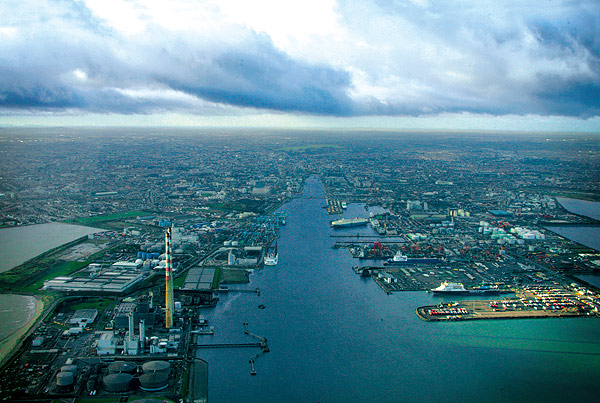
Dublin Port Company - a profitable state company
This is a smash-and-grab raid, redolent of a bankrupt Government philosophy. It is one thing to consider selling off the family jewels when, at least, the householder would still have access to the house. To sell off the ports is akin to the householder selling off the driveway, porch and front door to the house, then having to pay for the right to use them to enter the house in the future.
The Government has failed to develop a national ports policy. In the Progressive Democrat-fuelled era when privatisation, competition and profits were its driving force, the ports were moved out of direct State ownership and turned into semi-State competing bodies. Iarnrod Eireann was permitted to largely opt out of rail freight operations through the ports. Turned loose to compete against each other, the port companies followed no overall national policy for the benefit of the nation and now their future has been put in the hands of a group whose chairman advocates the sale of State companies and has already shown a lack of concern for the marine sector by shutting down the national sail training programme.
Aspects of journalism these days disappoint me after 45 years in the profession. Colm McCarthy who led Bord Snip Nua, is now chairing what is, effectively, ‘board privatisation,’ yet sections of the media seem largely to accept his views without question. I have not seen a lot of reportage which refers to his scathing opposition to the building of the DART, the Dublin Area Rapid Transport system, which he described as financial insanity and profligacy. Had those views been accepted, there would be no DART in Dublin, the consequences of which today are interesting to consider.
Privatisation of the ports should be strongly opposed. These are vital national assets. The lesson of selling-off Eircom has also, apparently, been forgotten by the Government.
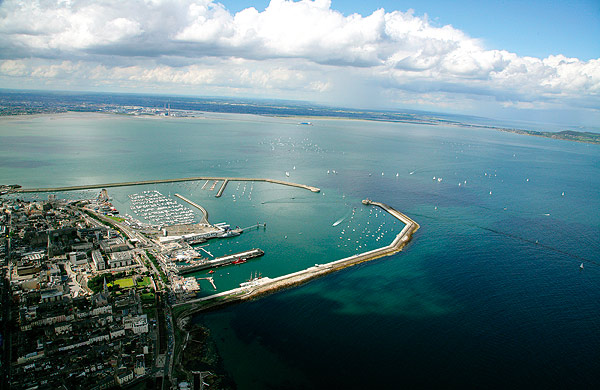
Dun Laoghaire Port on Dublin Bay
A Republic should be an entity in which there is open debate about public policy, not decision-making by elites. Flogging off our best assets, which is what this move by the Government is about, will not solve the nation’s problems. It is shocking to think that money from the sale of our vital transport arteries, the ports, could go to benefit those property speculators and banks which have bankrupted this nation.
This article is reprinted by permission of the CORK EVENING ECHO in which Tom MacSweeney writes maritime columns twice weekly. Evening Echo website: www.eecho.ie



























